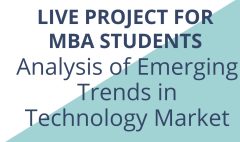Policy Impact
Policy Impact
Discover the powerful impact of MBA graduates in shaping government policy. From analysis to implementation, MBAs are transforming public sector decision-making.
The intricate world of government policy is not just the domain of politicians and civil servants. Today, MBA graduates are increasingly stepping into this sphere, wielding a unique blend of business acumen and strategic thinking to influence effective decision-making. In this deep dive, we explore how the skills honed through an MBA program become invaluable in policy analysis, development, and implementation.
Analytical Prowess in Policy Analysis
At the heart of effective policy-making is robust analysis. MBA graduates are trained to dissect complex business cases, a skill directly transferable to evaluating the potential impacts of policy proposals. They bring an ability to not just look at issues in isolation but to understand the wider systemic implications – economically, socially, and environmentally.
Strategic Development of Policy
Creating policy requires a strategic outlook. MBA graduates excel in setting clear objectives, identifying stakeholders, and foreseeing both opportunities and challenges. This strategic mindset, coupled with skills in finance, marketing, and operations, allows MBAs to craft policies that are comprehensive, sustainable, and feasible.
Effective Communication and Stakeholder Engagement
MBA programs place a strong emphasis on communication skills – an absolute necessity in the realm of policy-making. Graduates are adept at presenting information clearly and persuasively, skills that are crucial when explaining policy nuances to stakeholders or the broader public. Furthermore, their understanding of stakeholder management ensures inclusive and effective engagement processes.
Implementing with Impact
The implementation phase is where many policies falter, but this is where MBA graduates shine. With their background in project management and change management, they can navigate the complexities of rolling out new policies, monitoring progress, making necessary adjustments, and ensuring the intended outcomes are achieved.
Ethics and Compliance
MBA graduates bring a strong ethical compass to the often murky waters of government policy, ensuring compliance, transparency, and accountability. Their commitment to corporate social responsibility and ethical governance is a significant asset in promoting integrity in policy-making processes.
Resources for Aspiring Policy-Makers:
- The World Bank – Public Policy and Administration – An invaluable resource for understanding global policy-making scenarios.
- MIT Sloan School of Management – Government and Policy Initiative – Provides insights into the intersection of management studies and policy impact.
- The National Bureau of Economic Research – Offers extensive research materials on economic policy impacts.
- Georgetown University – McCourt School of Public Policy – Ideal for those interested in further specialization in public policy post-MBA.
Conclusion:
MBA graduates are uniquely equipped to contribute significantly to government policy-making. Their analytical skills, strategic thinking, ethical standards, and proficiency in implementation are transforming the landscape of public sector decision-making. For those aspiring to make a societal impact, the government sector offers a realm of opportunities to apply your MBA learning to real-world challenges.








